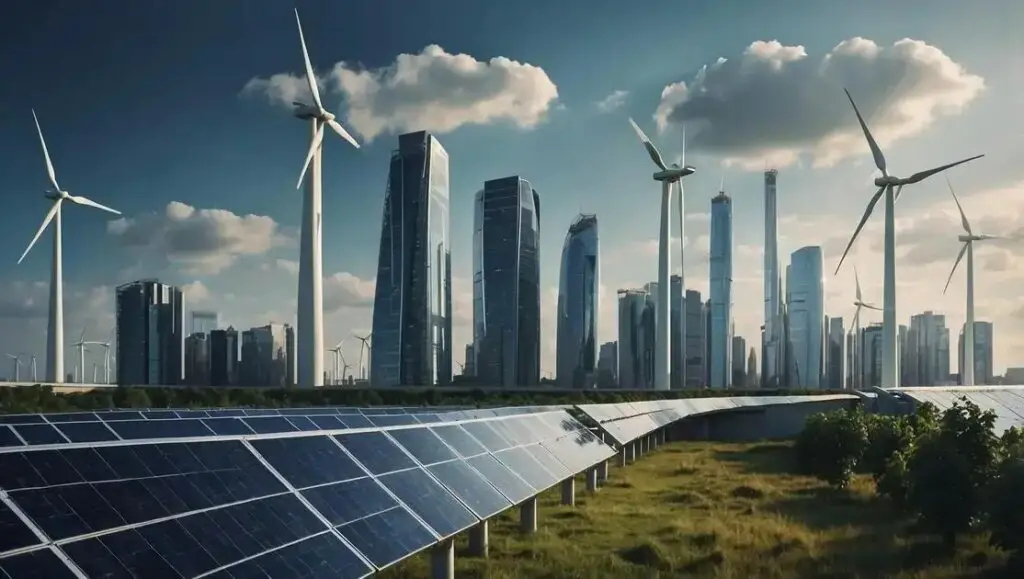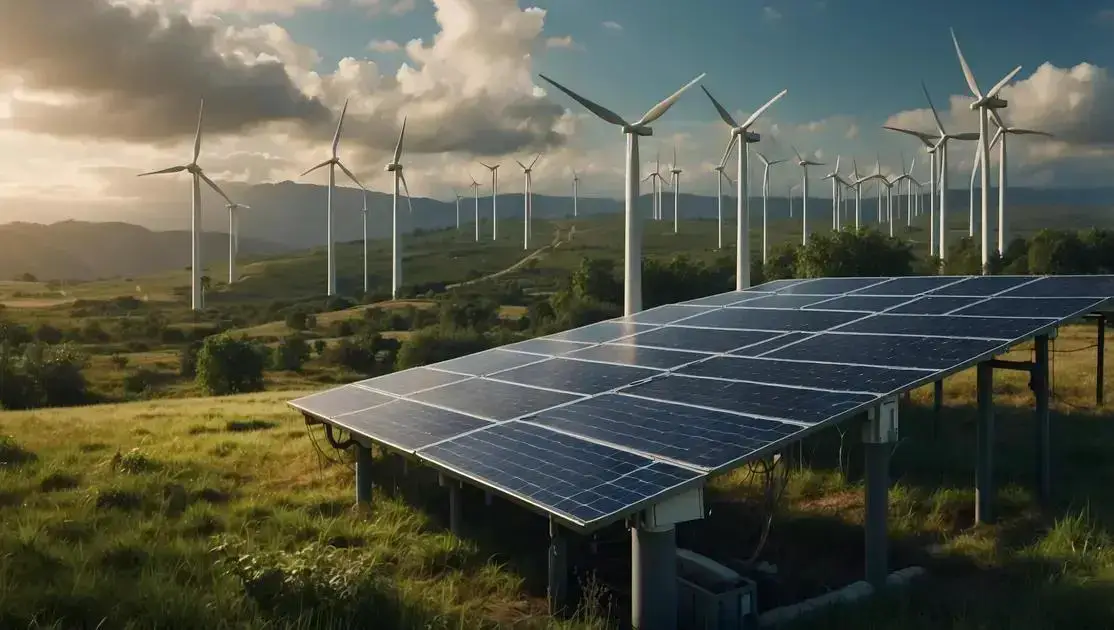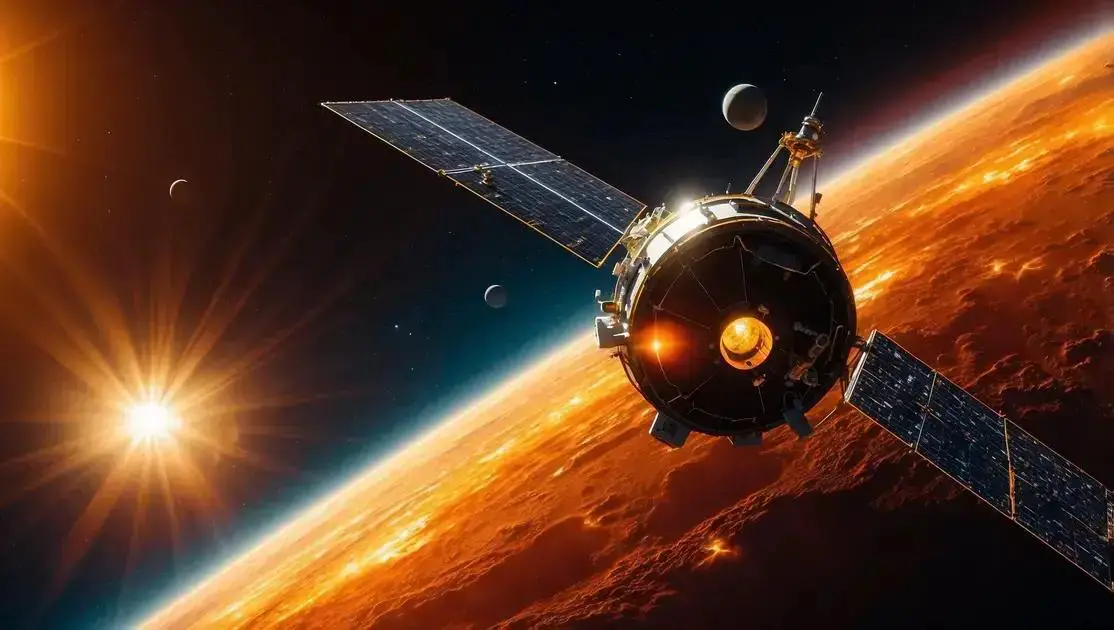Power Solutions are becoming increasingly essential for businesses aiming to improve energy efficiency and sustainability. In today’s competitive landscape, understanding these solutions can lead to significant advantages, whether for reducing costs or minimizing environmental impact. This article will delve into what power solutions entail, their benefits, and the latest innovations that are reshaping the energy sector.
Table of Contents
ToggleUnderstanding Power Solutions
When it comes to Power Solutions, it is crucial to understand the different types available and their applications during emergencies. During unexpected power outages, having reliable power solutions can mean the difference between safety and chaos.
Types of Power Solutions
There are several types of power solutions, each suited for different situations. Common options include:
- Generators: These are portable or stationary machines that produce electricity. They can run on various fuels, including gasoline, propane, or diesel and are vital during lengthy outages.
- Inverters: These devices convert direct current (DC) from batteries into alternating current (AC) for powering household appliances.
- Battery Backup Systems: Equipped with large rechargeable batteries, these systems store energy for use during power interruptions.
- Hand-Crank Radios: Ideal for communication during emergencies, these small devices can operate without electricity, offering essential news updates.
How Power Solutions Work
Power solutions function by converting various forms of energy into electricity. Generators, for example, burn fuel to create power, while solar panels use sunlight. While the operation varies, the goal remains the same: to ensure electricity is available when it’s needed most.
Importance of Reliable Power Solutions
Understanding power solutions is essential because they provide security in emergencies. Whether it’s ensuring food safety with refrigerators or maintaining communication, having the right solutions in place can mitigate risks and enhance safety.
Choosing the Right Power Solution
When considering power solutions, evaluate your requirements. Think about factors such as the load (how many devices you need to power), portability, fuel availability, and your budget. By assessing these aspects, you can select the most efficient and suitable emergency power solution for your needs.
Benefits of Efficient Power Solutions
Efficient Power Solutions offer numerous advantages that can significantly impact individuals and businesses, especially during emergencies. Understanding these benefits is essential for making informed decisions about power solutions.
Cost Savings
One of the primary benefits of efficient power solutions is cost savings. By using generators, inverters, or solar panels designed for efficiency, you can reduce energy consumption and lower your utility bills. Longer-lasting power solutions also reduce the need for frequent replacements, saving money in the long run.
Reliable Energy Supply
Efficient power solutions provide a more reliable energy supply during emergencies. High-quality generators and backup systems ensure that critical appliances and devices remain operational, preventing disruptions that could lead to food spoilage or loss of communication.
Environmental Benefits
Choosing efficient power solutions also contributes to environmental sustainability. Solutions like solar panels and energy-efficient generators produce fewer emissions, reducing your carbon footprint. This shift helps combat climate change and promotes a healthier environment.
Versatility and Flexibility
Efficient power solutions come in various forms, allowing you to select one that meets your specific needs. From portable generators ideal for outdoor activities to solar panels perfect for home use, these solutions offer versatility, enabling users to adapt to different circumstances and locations.
Safety and Peace of Mind
Having a reliable power supply during emergencies enhances safety and peace of mind. You can stay connected, access critical information, and operate essential equipment with confidence. This assurance can reduce stress and help you remain focused during unexpected situations.
Innovative Technologies in Power Solutions
Innovative technologies are transforming power solutions, making them more efficient and user-friendly. Below are some advancements that are changing how we think about emergency power.
Smart Generators
Smart generators are equipped with sensors and connectivity features that allow real-time monitoring and management. Users can track performance, fuel levels, and potential maintenance needs through mobile apps, ensuring preparedness during emergencies.
Solar-Powered Solutions
Solar technology is becoming more advanced and accessible. Portable solar panels and solar generators are great for emergencies. They harness sunlight to provide clean energy, making them environmentally friendly options for power outages.
Battery Storage Systems
Battery storage technology has improved significantly, allowing users to store energy for later use. Systems like the Tesla Powerwall can store solar energy and supply backup power during an outage, offering flexibility and peace of mind.
Hybrid Power Solutions
Hybrid power solutions combine multiple sources of energy, such as solar, wind, and traditional fuels. This integration enhances efficiency and provides a reliable power source, even when one energy source is unavailable.
Energy Management Systems
Energy management systems help monitor and control energy usage in real-time. These systems optimize power consumption, providing insights for more efficient energy use. They can also prioritize essential loads during an outage.
How to Choose the Right Power Solution
Choosing the right power solution requires careful consideration of several factors. Whether for home, business, or emergency use, understanding these elements can help you make the best choice.
Assess Your Power Needs
First, determine how much power you need. List the essential devices you want to support during an outage, such as refrigerators, lights, and medical equipment. This will help you identify the capacity required from your power solution.
Consider the Duration of Outages
Think about how long you might need power during an outage. If you expect long outages, a larger generator or a robust battery backup system may be necessary. For shorter interruptions, a smaller solution may suffice.
Evaluate Fuel Options
Different power solutions run on various fuels, including gasoline, propane, or solar energy. Consider what fuel is readily available in your area and what you are willing to manage. Solar-power solutions can be more sustainable but may require an initial investment in solar panels.
Portability and Storage
Look at how portable you want your power solution to be. If you need to move it around, select a lightweight, compact generator or a battery system. For stationary use, larger, more powerful generators may be appropriate.
Budget Constraints
Your budget will play a significant role in your choice. Set a budget that includes not just the initial purchase but also maintenance and fuel costs over time. Remember, investing in quality can save money in the future.
Research Brands and Models
Before making a purchase, research reputable brands and read reviews for different models. Investigating customer experiences can provide insights into the reliability and performance of a power solution.
Case Studies of Successful Power Solutions
Examining case studies of successful power solutions can provide valuable insights into how different systems perform in real-world situations. Here are some notable examples:
1. Community Resilience in Hurricane-Prone Areas
A small town in Florida faced frequent power outages due to hurricanes. They decided to invest in a community-wide solar power solution, installing solar panels on public buildings. This move not only provided energy during outages but also reduced electricity costs in the long run. Residents reported feeling safer knowing they had a dependable energy source.
2. Business Continuity for a Local Grocery Store
A grocery store experienced challenges during a recent storm when its power went out for several days. They implemented a natural gas generator, which allowed them to maintain refrigeration and lighting. The generator ensured that food remained fresh and the store could serve its customers, ultimately preserving revenue during the crisis.
3. Solar-Powered Off-Grid Cabin
A family built an off-grid cabin in a remote area and opted for a solar power system. The cabin features solar panels, a battery storage system, and energy-efficient appliances. This choice allowed the family to enjoy modern amenities without relying on the grid, providing a sustainable lifestyle while being resilient to local power outages.
4. Emergency Response Mobile Units
During natural disasters, mobile emergency response units equipped with solar generators have been deployed effectively. These units allow rescue teams to operate tools and communicate without relying on local power infrastructure. This innovative use of power solutions has improved response times during critical situations.
5. Hospitals Utilizing Backup Power Solutions
In a city facing regular blackouts, a local hospital invested in a robust backup power system. They installed large diesel generators to ensure operations, from surgeries to essential patient care, are uninterrupted. This investment has helped the hospital maintain its reputation as a reliable care provider even during outages.
Power Solutions for Renewable Energy
Power solutions for renewable energy are essential for creating a sustainable future. These solutions harness natural resources and minimize environmental impact. Here are some key aspects of renewable energy power solutions.
Solar Power Systems
Solar panels capture sunlight and convert it into electricity. They are highly effective for both residential and commercial applications. These systems can provide power during outages, making them invaluable for emergency situations.
Wind Energy Solutions
Wind turbines harness the power of wind to generate electricity. Farm or community-scale wind turbines can serve as excellent emergency power solutions by providing a backup source when traditional grids fail.
Hydropower Systems
Hydropower uses flowing water to produce electricity. Micro-hydro systems can be established in remote areas, providing consistent energy without dependence on fossil fuels.
Biomass Energy
Biomass energy is produced from organic materials like plants and animals. This type of energy can be local and often used for heating and electricity, providing a reliable power source during emergencies.
Geothermal Energy
Geothermal power utilizes heat from the Earth to generate electricity and can also be used for heating. Homes in appropriate areas can access geothermal systems, providing a consistent energy supply.
Battery Storage for Renewable Energy
Battery storage systems store energy generated from renewable sources for later use. This technology is crucial for reliability, especially during cloudy days or calm conditions when solar or wind power generation is low.
Common Myths About Power Solutions
There are many common myths about power solutions that can lead to misconceptions and poor decision-making. Understanding the truth behind these myths is essential for effective energy planning.
1. Myth: All Generators Are the Same
Many people believe all generators function the same way, but this is false. Generators come in various sizes and types, each designed for specific applications. Understanding your needs is crucial for choosing the right generator.
2. Myth: Solar Power Only Works in Sunny Areas
It is a common belief that solar panels can only generate energy in sunny locations. However, they can produce energy in cloudy or colder climates, although their efficiency may vary. Proper placement and technology can enhance their output.
3. Myth: Power Solutions Are Too Expensive
People often think that investing in power solutions like solar panels or generators is too costly. However, the long-term savings on energy bills and the benefits during outages can outweigh the initial investment.
4. Myth: Backup Power Is Only for Businesses
Many believe that backup power solutions are only necessary for businesses. In reality, homeowners also need reliable backup options, especially in areas prone to power outages. Generators and battery systems are just as valuable for residential use.
5. Myth: Renewable Energy Is Unreliable
Some think renewable energy solutions, such as wind or solar, are not reliable because they depend on weather conditions. While it’s true that they can fluctuate, integrating battery storage and hybrid systems can provide a consistent power supply.
6. Myth: Power Solutions Require Extensive Maintenance
There is a misconception that all power solutions, especially generators, require frequent maintenance. While routine checks are beneficial, many modern systems are designed to be user-friendly and require minimal upkeep.
Future Trends in Power Solutions
The future of power solutions is evolving rapidly, driven by technological advances and growing energy demands. Here are some emerging trends that are influencing how we approach power solutions moving forward.
Smart Energy Management Systems
Smart grids and energy management systems are becoming central to power solutions. These systems use advanced analytics and IoT technology to optimize energy distribution and consumption, ensuring efficiency and reliability during outages.
Increased Adoption of Renewable Energy
More individuals and businesses are investing in renewable energy solutions, such as solar and wind. This trend is leading to the enhancement of energy storage technologies, making it easier to store excess energy generated during peak production times.
Integration of Battery Storage
Battery storage systems are gaining popularity for both residential and commercial uses. With improved technology, batteries can now store larger amounts of energy, providing a reliable backup option for times when renewable sources are unavailable.
Mobile Power Solutions
Portable and mobile power solutions, such as compact generators and solar chargers, are being developed to meet the needs of our on-the-go lifestyles. These solutions are lightweight, easy to use, and often environmentally friendly.
Focus on Energy Efficiency
As the cost of energy rises, there is a growing focus on energy efficiency across all sectors. Innovations in appliances and power solutions aim to minimize energy consumption without sacrificing performance, creating a more sustainable energy future.
Hybrid Power Systems
Hybrid systems that combine different energy sources, such as solar and diesel generators, are becoming more common. These systems offer flexibility and reliability, ensuring consistent power supply, especially in emergencies.
How Power Solutions Impact Your Bottom Line
Power solutions significantly affect your bottom line, whether you are a small business owner or managing a large corporation. Here’s how these solutions can impact your finances.
Operational Cost Reduction
Implementing energy-efficient power solutions can lead to lower utility bills. Devices like solar panels and energy-efficient generators not only reduce energy consumption but also cut monthly costs.
Continuous Operations
Reliable power solutions ensure that your business can operate without interruptions. Backup generators and battery systems keep essential services running during outages, protecting against revenue loss.
Improved Productivity
Having a dependable power source allows employees to work without distractions. Fewer outages mean more consistent productivity, which can lead to increased profits.
Enhanced Reputation
A business that can maintain operations during emergencies builds trust with customers. Strong reliability in providing services or products strengthens your reputation, leading to increased customer loyalty and sales.
Investment in Renewable Energy
Investing in renewable power solutions can provide tax benefits and incentives. Many governments offer financial programs for businesses that adopt clean energy solutions, improving overall financial health.
Long-Term Savings
Though the upfront costs of power solutions may seem high, the long-term savings can be substantial. Over time, lower energy costs and reduced maintenance expenses lead to significant savings that positively impact your bottom line.
In Conclusion: Embracing Innovative Power Solutions
Implementing effective power solutions is essential for both individuals and businesses seeking to optimize energy use and maintain operations during emergencies. From generators to solar panels, the landscape of power solutions offers myriad options tailored to various needs.
Understanding the benefits, choosing the right solutions, and dispelling common myths are key steps in maximizing their potential. As you explore case studies of successful implementations and future trends, consider how these innovations can enhance your resilience in the face of challenges.
By investing in reliable power solutions, you not only ensure continuity and efficiency but also contribute to a sustainable future. So take the necessary steps to integrate these solutions into your life or business strategy for lasting positive impact.
FAQ – Frequently Asked Questions About Power Solutions
What are power solutions?
Power solutions refer to various systems and technologies that provide electricity, especially during outages or emergencies. This includes generators, solar panels, and battery storage systems.
How can power solutions reduce costs?
Implementing energy-efficient power solutions can lead to lower utility bills and reduced operational costs, resulting in significant long-term savings.
Are solar panels effective in cloudy weather?
Yes, solar panels can still generate electricity in cloudy conditions, though at a lower efficiency. They are designed to capture and convert available sunlight into energy.
What is the benefit of having a backup generator?
A backup generator ensures continuous power supply during outages, preventing loss of productivity and protecting sensitive equipment.
Do renewable energy solutions require a lot of maintenance?
Most renewable energy solutions, like solar panels, require minimal maintenance. Regular checks and occasional cleaning are typically all that is needed.
What are hybrid power systems?
Hybrid power systems combine renewable energy sources, such as solar and wind, with traditional generators. This approach enhances reliability and allows for more efficient energy use.











